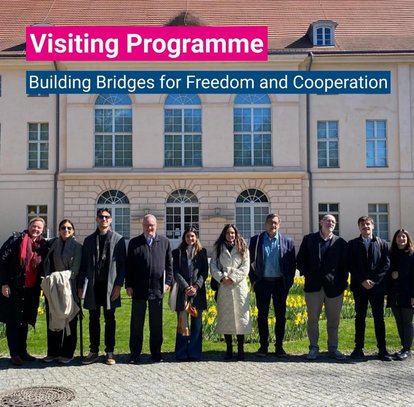Delegations
When Democracy Defends Itself: Reflections from Berlin to Buenos Aires

Today Germany faces a complex situation in the face of the Russian threat. Its priorities are increasing the defence budget and seeking strategic autonomy. Military enlistment campaigns can be seen on the streets of Berlin, and some are proposing to reinstate conscription. There is a shift from its historic soft power strategy to a more realistic and urgent hard power approach. National security is no longer measured only in diplomacy: today it requires military robustness.
While Putin generates fear and the war in Ukraine is a regional threat, Germany remains Europe's locomotive and has the world's third largest economy. Russia accounts for barely 10 per cent of the EU's GDP, has three times less population and loses about 1,000 soldiers per day. Germany alone is twice the size of Russia's GDP and the average German citizen produces three times as much as a Russian. Germany's economy is sophisticated and diversified; Russia, by contrast, remains tied to commodity prices.
But seen from Argentina, what is more interesting is the institutional aspect. Germany is a federal republic with full rule of law. Today its national security strategy recognises that protecting democracy also means protecting sovereignty. Because of its history and the failure of the Weimar Republic, its Basic Law embodies the paradigm of militant democracy: a democracy that defends itself against those who seek to destroy it from within using its own legal mechanisms.

The Delegation of the Visiting Programme: Building Bridges for Freedom and Cooperation in Berlin
This principle is embodied in three pillars: unchangeable constitutional clauses (Art. 1 and 79 para. 3), firm bans on anti-democratic parties (Art. 21 para. 2 and 3) and a Constitutional Court as the guardian of the constitution (Art. 94). In addition, Germany has a Federal Office for the Protection of the Constitution, which recently declared an extreme right-wing party incompatible with the democratic order. Its latest national security strategy proposes to ‘effectively counter threats from all forms of extremism, in particular right-wing extremism’.
Some authors such as Steven Levitsky and Daniel Ziblatt speak of ‘democratic erosion’, referring to the gradual process by which democracies cease to function fully as such, not through coups or violent ruptures, but through a slow and legal deterioration of democratic institutions from within. In this sense, it is worth recalling the concept of ‘legal revolution’, which refers to a radical change in the political order that is brought about through existing legal mechanisms, without the need for a violent insurrection or coup d'état.
We must recognise that certain anti-democratic actors use formally legal instruments to undermine republican values. This paradox of how to make democracy defend itself without becoming anti-democratic demands an active response. Today, populisms - on the left or the right - abuse mechanisms that appear to be formal but substantially serve anti-democratic purposes (although there are several examples, the recent appointment of commissioned judges to the Argentinean supreme court is telling).
Anti-democratic sectors no longer need old-style insurrections: it is enough to manipulate institutions, abuse emergency mechanisms such as decrees with legislative content (DNU), legislative delegations, intensify hyper-presidentialism, colonise courts of justice through different mechanisms, attack free journalism or simply undermine public confidence through disinformation campaigns. These are the cases, with differences, of countries such as Hungary, Poland, India, El Salvador, among others.
This is one of the central risks for Argentina. Our country lacks a clear strategy to prevent foreign or domestic interference by anti-democratic agents, cyber-attacks, strategic corruption or electoral disinformation (we recently saw the use of artificial intelligence to manipulate and deceive the will of the electorate in local elections). Internal polarisation, coupled with a lack of basic consensus, makes us vulnerable to hybrid attacks aimed at undermining social cohesion and institutional legitimacy. We must assume that the defence of our institutions is also a matter of national security.
Germany, without being a perfect model, has built a state policy where moderation and consensus between the centre-left and centre-right resist the advance of extremism. Democracy in Germany is protected and the foreign financing of parties is investigated (the case of the far-right AfD, which won in territories with former Soviet influence and is now being investigated for possible support from Russia), disinformation networks are monitored, and democratic order is actively protected. It is an example of how a democracy can become resilient without giving up freedom.
From Argentina, we need a comprehensive look at national security: it is not enough to shield borders if we leave our electoral, media and justice systems open to destabilising influences. Argentina's democracy can no longer be naïve. As in Germany, we must assume that defending institutionality is also defending our sovereignty.
